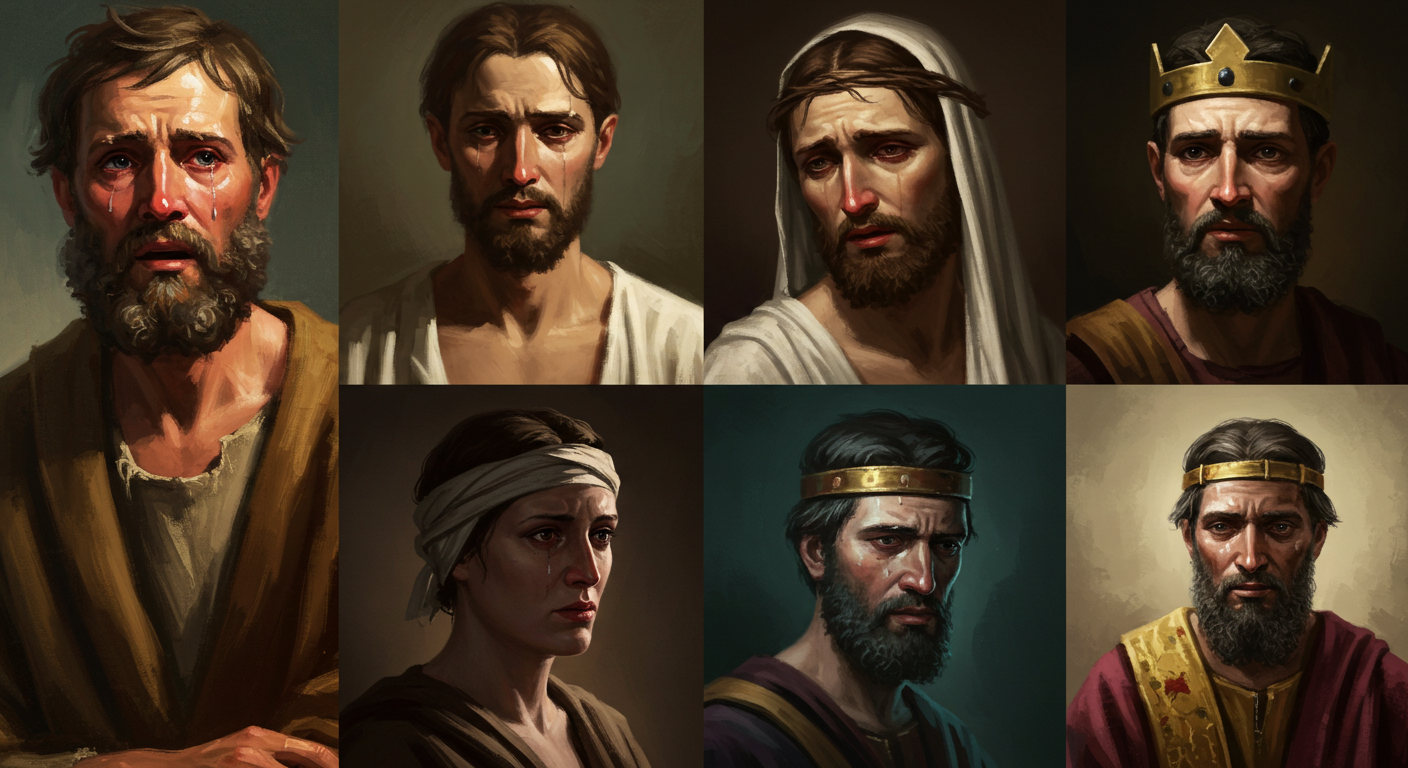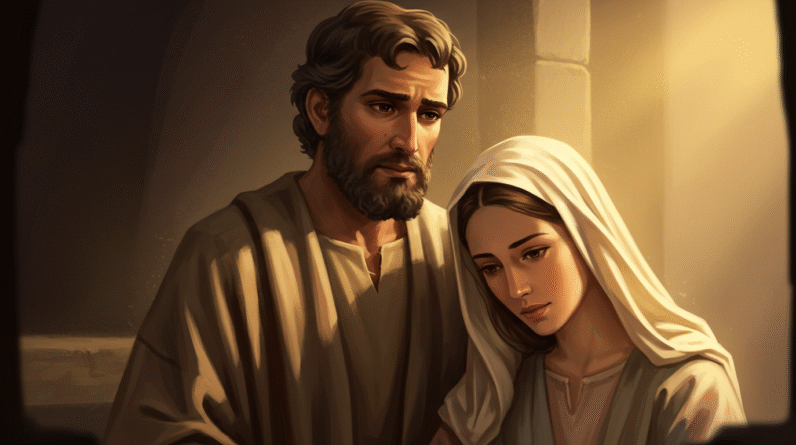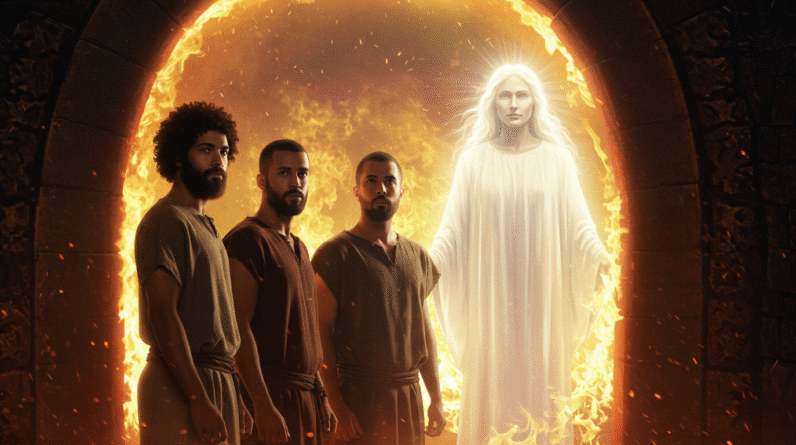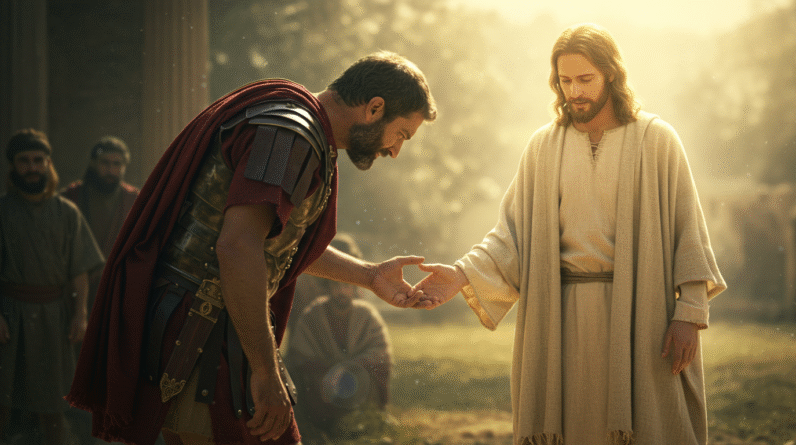Explore the transformative journeys of David and Zacchaeus, embodying the timeless theme of repentance in 2 Samuel 12:13 and Luke 19:8-9. Discover redemption.
Repentant Characters – 2 Samuel 12:13; Luke 19:8-9
Repentance is a universal theme that resonates through time, transcending cultural and historical boundaries. In the Bible, it manifests through the journeys of myriad characters. These stories of transformation are intrinsically human, reminding us of our capacity for change and redemption. Let’s delve into two such examples: King David, as narrated in 2 Samuel 12:13, and Zacchaeus, found in Luke 19:8-9.

King David
King David is undoubtedly one of the most complex and renowned figures in Biblical narratives, a man of profound faith yet prone to grave mistakes.
Their Story in the Bible
David’s story in the Bible is rich and multifaceted, but one particularly poignant chapter comes after his adulterous affair with Bathsheba, and the subsequent orchestrated death of her husband, Uriah, 2 Samuel 11. This series of missteps reached a turning point when the prophet Nathan confronted David. This pivotal moment, captured in 2 Samuel 12:13, is a profound demonstration of personal accountability and repentance. Here, David acknowledges his sin with a simple yet powerful admission, “I have sinned against the Lord.”
In David’s journey, his sincerity is underscored through his subsequent actions. Psalm 51, traditionally attributed to him following this confrontation, reveals a heart seeking purity and restoration. His path of repentance didn’t just bring him personal peace; it revitalized his spiritual leadership and fortified his kingdom, showing how personal change can ripple through to affect wider communities.
Lessons from Their Life
David’s life offers potent lessons in humility and accountability. His narrative teaches us that no matter how grave our misdeeds, acknowledgment and sincere repentance pave the way for healing and redemption. David’s penchant for introspection and his deep relationship with God are reflections of the innate resistance against spiritual stagnation. His journey emphasizes the importance of seeking divine wisdom over worldly knowledge, reassuring us that faith and humility are cornerstones of spiritual resilience.
Connection to Today’s World
In a world where public image often outweighs personal integrity, David’s story is a vital reminder of the power of repentance. It encourages us to face our transgressions and transform our lives courageously. Today, many struggle with the burden of secrecy and guilt, a struggle magnified by the digital age. David’s repentance is a beacon of hope, urging us to choose truth and grace over fear and deception.
Key Bible Verse
“The Lord has taken away your sin. You are not going to die.” – 2 Samuel 12:13
This verse captures the essence of divine mercy and grace, emphasizing that true repentance opens the door to forgiveness and new beginnings. It reminds us that while the consequences of our actions can be severe, God’s grace is infinitely more powerful.
Thought-Provoking Question
When your actions have unforeseen negative consequences, are you willing to take responsibility like David and seek forgiveness and restoration?
Zacchaeus
Zacchaeus’ story is a heartwarming tale of transformation and redemption, illustrating the power of genuine repentance.
Their Story in the Bible
Zacchaeus, a tax collector, is introduced to us in Luke 19:1-10 as a man who was wealthy, yet socially ostracized due to his profession. Tax collectors were notorious for being unscrupulous, and Zacchaeus was no exception. His encounter with Jesus, however, changed everything. Intrigued and eager to see Jesus, Zacchaeus climbed a sycamore tree, demonstrating his determination despite his stature and societal status.
The unexpected occurs when Jesus singles him out, choosing to stay at his house. Stunned and touched by this gesture, Zacchaeus pledges to give half of his possessions to the poor and repay anyone he has cheated fourfold. This promise, found in Luke 19:8-9, marks a remarkable turning point in his life — an acknowledgment of past wrongs and a commitment to restitution.
Lessons from Their Life
Zacchaeus’ narrative reinforces the idea that genuine change stems from within. His repentance wasn’t superficial; it was transformative, manifesting through his actions. He exemplifies the importance of pursuing integrity, demonstrating that one’s past does not define one’s future. Zacchaeus encourages us to welcome change and to act decisively and generously when we realize our missteps, showing that the path to righteousness often involves restitution and making amends.
Connection to Today’s World
In today’s fast-paced world, where material wealth often dictates success, Zacchaeus’ story is a clarion call to prioritize ethical values over financial gain. Many grapple with feelings of inadequacy or the burden of their past actions. Zacchaeus’ encounter with Jesus shows that acceptance and change are always possible, echoing a need for compassion and fairness in our societies, workplaces, and personal lives today.
Key Bible Verse
“But Zacchaeus stood up and said to the Lord, ‘Look, Lord! Here and now I give half of my possessions to the poor, and if I have cheated anybody out of anything, I will pay back four times the amount.’” – Luke 19:8
This verse vividly depicts Zacchaeus’ repentance, symbolizing his transformation and commitment to overhauling his life. It holds a powerful message: true repentance requires action and accountability, restoring our relationship with others and with God.

Thought-Provoking Question
Are there areas in your life where you can take proactive steps towards repentance, offering restitution, and genuine change?
Historical/Cultural Context
Understanding the historical context of these stories enriches our appreciation of these narratives. David lived in a time when kings were seen as earthly extensions of divine authority, making his acknowledgment of sin both humbling and radical. His actions set a precedent in a time when kings were rarely questioned or held accountable.
Zacchaeus, on the other hand, existed within a socio-political framework that viewed tax collectors as collaborators with the oppressive Roman regime. His transformation was not only personal but had social implications, reflecting the potential of individual change to challenge and transcend societal norms and expectations.
Comparison with Other Characters
Both David and Zacchaeus share similarities in their stories with other Biblical figures. David’s confrontation and subsequent transformation echo the journey of Peter, who, after denying Jesus, went on to become a cornerstone of the early Church. Similarly, Zacchaeus’ openhearted change mirrors that of Paul, who transformed from a persecutor of Christians to one of their most fervent apostles.
Prayer
Dear God, like David and Zacchaeus, we come before you acknowledging our shortcomings and seeking your grace. Grant us the courage to face our transgressions and the strength to change. May our lives reflect true repentance through our actions and decisions. Amen.







